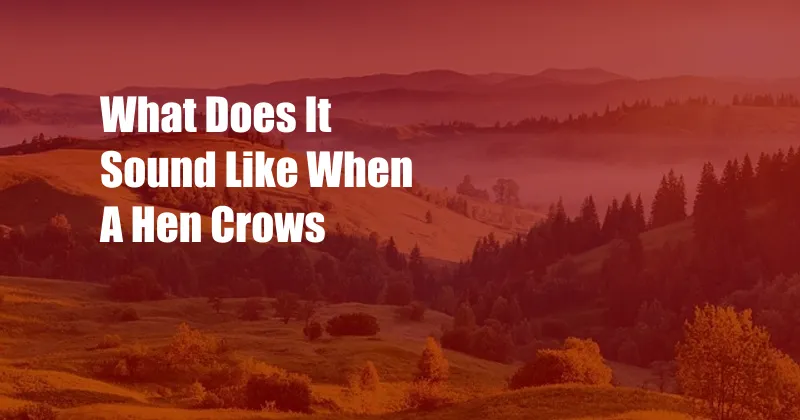
What Does It Sound Like When a Hen Crows?
In the symphony of farmyard melodies, the familiar cacophony of a rooster’s crow is a morning staple. But what happens when the tables are turned, and a hen takes center stage in the vocal performance? Surprisingly, hens do have the ability to crow, albeit with a markedly different sound from their male counterparts.
Unlike the resonant and piercing crow of a rooster, a hen’s crow is typically a series of short, staccato notes that are best described as a sharp “cackle” or “squawk.” This distinctive vocalization serves as a hen’s way of communicating various messages to her flock.
The Hen’s Cackle: A Multifaceted Communication
The hen’s cackle can convey a range of meanings depending on its pitch, duration, and context. Here are some common interpretations:
- Egg-laying announcement: A loud, prolonged cackle typically accompanies a hen’s successful egg-laying. This vocalization serves to alert other hens to the availability of fresh eggs.
- Danger alert: A high-pitched, urgent cackle signals a potential threat to the flock. This warning sound prompts hens to gather their chicks for protection.
- Socialization: A series of short, rapid cackles can indicate a hen’s desire to interact with others in the flock. This vocalization helps maintain social bonds and strengthen the flock’s cohesion.
- Stress or illness: A hen’s cackle can also express stress, discomfort, or health issues. A prolonged or unusual cackle may warrant further investigation to determine the underlying cause.
The Biology Behind the Cackle
The anatomy of a hen’s vocal apparatus differs from that of a rooster. Hens have a smaller syrinx, the vocal organ located at the base of the trachea, which produces the distinctive cackling sound. In contrast, roosters possess a larger syrinx, enabling them to produce the louder, resonant crowing noise.
Additionally, hens have a different hormone profile than roosters, which influences their vocalizations. Testosterone levels are higher in roosters, contributing to their more assertive and frequent crowing behavior. Conversely, hens have lower testosterone levels, resulting in their less pronounced and sporadic cackling.
Tips and Expert Advice
- Pay attention to the context: When interpreting a hen’s cackle, it’s crucial to consider the surrounding circumstances and the hen’s behavior. This will help you determine the specific message she is trying to convey.
- Observe the flock: The flock’s response to a hen’s cackle can provide additional clues to her intentions. If the hens gather around or engage in protective behavior, it’s likely a danger alert. Conversely, if they ignore the cackle, it may simply be a social call.
- Monitor for changes: A sudden or prolonged change in a hen’s cackling behavior may indicate a health issue or stress. If you notice any unusual vocalizations, consult a veterinarian for further assessment.
FAQs on Hen Cackling
- Q: Why do hens cackle after laying an egg?
A: Cackling after egg-laying is a natural behavior that helps hens announce their accomplishment to the flock. It also attracts a potential mate’s attention.
- Q: Can hens crow like roosters?
A: No, hens cannot crow like roosters. The anatomy of their vocal organs and hormone profiles differ, resulting in their distinctive cackling sound.
- Q: What does it mean if a hen cackles at night?
A: A hen cackling at night may indicate a potential predator or disturbance in the coop. It’s important to investigate the cause and ensure the safety of the flock.
Conclusion
The hen’s cackle, while not as well-known as the rooster’s crow, is an equally important form of communication in the farmyard. By understanding the different meanings behind a hen’s cackle and its significance within the flock, we gain a deeper appreciation for the complex social and vocal behaviors of these fascinating creatures.
Are you interested in learning more about the vocalizations and behaviors of poultry? Let me know in the comments below, and I’ll be happy to share my insights and research.